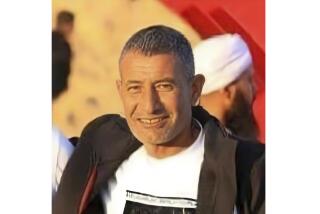Kidnappers in Iraq Release 2 Italian Women
BAGHDAD — Kidnappers in Iraq freed seven hostages Tuesday, releasing two female Italian aid workers who were abducted from their home three weeks ago, two of the women’s Iraqi colleagues and three Egyptian employees of a local cellphone company.
The releases, which come after beheadings of several foreign hostages, raised hopes that other captives in Iraq might be freed. At least 18 foreigners, including a Briton, two Frenchmen and 10 Turks, are believed to be in captivity. A French negotiator told an Arab TV channel Tuesday that the two French journalists held since last month might be released within 48 hours.
The freed Italians, Simona Pari and Simona Torretta, both 29, had been working on humanitarian projects in Iraq to improve schools and water infrastructure. They were kidnapped Sept. 7 in a bold daylight attack, and their ordeal had transfixed and anguished the Italian public.
A video of the women’s release, aired on the TV channel Al Jazeera, showed the two lifting their black veils and smiling broadly upon being greeted by Maurizio Scelli, head of the Italian Red Cross in Baghdad. One of the women turned to a man, possibly a hostage mediator, and said in Arabic, “Thank you very much. Goodbye.”
The women were quickly flown to Italy and were greeted about 11:15 p.m. at Rome’s Ciampino Airport by a small group of friends and family members, as well as Prime Minister Silvio Berlusconi.
Asked by reporters how she felt, Pari said, “Good,” and smiled.
“It went well. We have been treated with a lot of respect,” Torretta told Italian news agencies.
The two women then boarded a helicopter, which took them to be debriefed by government officials.
Over the last three weeks, at least two militant groups had claimed responsibility for abducting the women and issued various demands, including the withdrawal of Italy’s 3,000 troops from Iraq.
Berlusconi had refused to give in to such demands, even though Italian journalist Enzo Baldoni was killed by kidnappers last month.
After being notified of the women’s release, Berlusconi went on television to inform the public and then addressed Parliament. “Finally, a moment of joy,” he told lawmakers.
Relatives of the two women -- who became known in Italy as Le Simone, or the Simonas -- appeared on their balconies Tuesday evening, some of them weeping and waving to scores of reporters.
“Love won,” Anna Maria Torretta said of her daughter’s release. “I prayed and I keep praying. It’s like being reborn; after the darkness comes the light.”
Both women had worked in Iraq for several years and had adamantly opposed the U.S.-led invasion. Their humanitarian agency, A Bridge to Baghdad, released a statement saying: “The only piece of news we wanted to hear has arrived. There will be time later to find out exactly how it all happened, but for now we just want to thank everyone who played a part in bringing this about.”
An Iraqi man and woman, Raad Ali Abdul Aziz and Mahnaz Bassam, who were kidnapped with the Italians and worked with the same aid organization, also were released. In TV interviews aired in Iraq, the Iraqis said they had been well-treated by the kidnappers.
Despite claims on two Islamic websites that the Italian women had been killed, Muslim leaders from Italy and Baghdad continued to work to secure their release. Individuals claiming to represent the hostage-takers began contacting potential go-betweens, according to one individual who said he had been approached.
The Italian government mounted a vigorous campaign to free the women, with senior officials canvassing the Arab world in search of help and support. Berlusconi, whose statements critical of Islam have inflamed passions, had kept relatively quiet until Tuesday.
The Jordanian government played a key role in negotiating the women’s release, Italian officials said. On Monday, Jordan’s King Abdullah II predicted that the women would be freed unharmed.
A Kuwaiti newspaper reported that the women’s families and employer paid a $1-million ransom, but officials in Iraq and Italy would not confirm that.
Italian authorities denied a similar report this year that the government had paid a ransom to free three Italian security guards kidnapped in Iraq.
U.S. military officials and Iraqi security forces were not involved in the negotiations, but offered assistance and monitored developments daily, said Sabah Kadhim, a senior official in Iraq’s Interior Ministry.
“We’re delighted,” he said Tuesday night. “It never should have happened in the first place.”
But Kadhim said that the release of the hostages did not mean that the kidnapping threat in Iraq was over. “As long as there is money to be made, criminal gangs will continue to do this,” he said.
Iraqi officials suspect that all of the hostages released Tuesday were abducted by criminals seeking ransoms, rather than by insurgents seeking to make political statements. “Obviously the primary motive here was money,” Kadhim said. In some cases, it is believed that criminals have carried out abductions and then handed over their captives to insurgent groups, perhaps for a fee.
Earlier Tuesday, three Egyptian employees of Cairo-based Orascom Telecom who were kidnapped a week ago were released. A fourth was freed Monday, Iraqi officials said.
It was unclear whether the Egyptians were taken by the same group that abducted the Italians and their Iraqi colleagues. Two additional Orascom workers, who were kidnapped separately, remained in captivity. Orascom operates Baghdad’s cellular telephone network.
In another development Tuesday, a French negotiator, Philippe Brett, told the Arabic-language satellite channel Al Arabiya that reporters Christian Chesnot and Georges Malbrunot, who disappeared last month on their way to cover violence in Najaf, south of Baghdad, could be released within 48 hours.
A group calling itself the Islamic Army in Iraq has claimed that it was holding the two journalists and has demanded that France reverse a law that bars Muslim girls from wearing head scarves in public schools.
Despite Brett’s remarks, a French Foreign Ministry spokesman denied any knowledge of a deal to free the journalists, Associated Press reported. And Didier Pillet, editor of the French regional newspaper Ouest, one of the publications Malbrunot works for, expressed skepticism that a deal was imminent.
“We have been in touch with the best possible contact at the Foreign Ministry, and have every reason to believe what he says, that the ministry doesn’t know that mediator,” Pillet told Reuters.
About 140 foreigners in Iraq have been kidnapped in recent months. The fate of British businessman Kenneth Bigley -- who was kidnapped two weeks ago with two co-workers from his home in Baghdad -- remains unclear. Bigley’s American colleagues, Eugene “Jack” Armstrong and Jack Hensley, were beheaded.
*
Sanders and Mulligan reported from Baghdad and Wilkinson from Ankara, Turkey. Maria De Cristofaro of The Times’ Rome Bureau and Times staff writer Ashraf Khalil in Baghdad contributed to this report.
More to Read
Sign up for Essential California
The most important California stories and recommendations in your inbox every morning.
You may occasionally receive promotional content from the Los Angeles Times.











